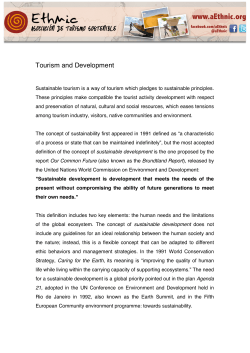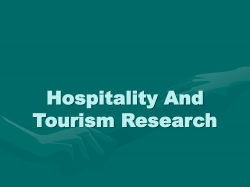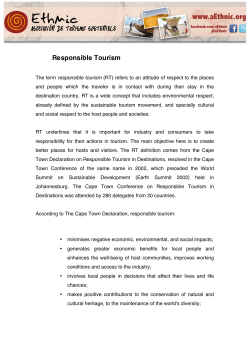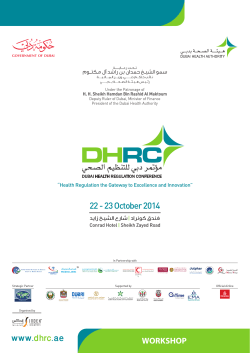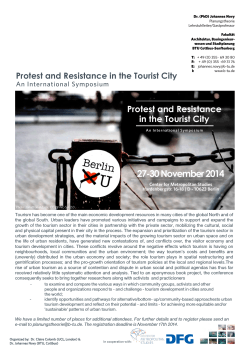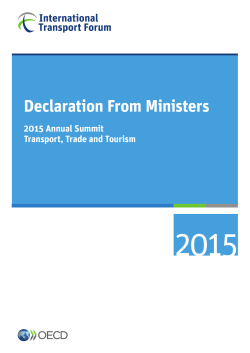
Regional Perspectives on Tourism Geographies: The Case of Greece
Geographies of Tourism Regional Perspectives on Tourism Geographies: The Case of Greece Paris Tsartas Harry Coccossis Magdalena Vasileiou Article information: Downloaded by Aegean University At 01:50 15 May 2015 (PT) To cite this document: Paris Tsartas Harry Coccossis Magdalena Vasileiou . "Regional Perspectives on Tourism Geographies: The Case of Greece" In Geographies of Tourism. Published online: 21 Aug 2014; 91-103. Permanent link to this document: http://dx.doi.org/10.1108/S1571-5043(2013)0000019006 Downloaded on: 15 May 2015, At: 01:50 (PT) References: this document contains references to 0 other documents. To copy this document: permissions@emeraldinsight.com The fulltext of this document has been downloaded 102 times since NaN* Users who downloaded this article also downloaded: Salvador Anton Clavé, Julie Wilson, (2013),"Conclusion: Contrasting Geographies of Tourism in Europe", Tourism Social Science Series, Vol. 19 pp. 179-198 http:// dx.doi.org/10.1108/S1571-5043(2013)0000019010 Nicolai Scherle, Hans Hopfinger, (2013),"German Perspectives on Tourism Geography", Tourism Social Science Series, Vol. 19 pp. 69-89 http://dx.doi.org/10.1108/ S1571-5043(2013)0000019005 C. Michael Hall, (2013),"Development(s) in the Geographies of Tourism: Knowledge(s), Actions and Cultures", Tourism Social Science Series, Vol. 19 pp. 11-34 http:// dx.doi.org/10.1108/S1571-5043(2013)0000019002 Access to this document was granted through an Emerald subscription provided by 463687 [] For Authors If you would like to write for this, or any other Emerald publication, then please use our Emerald for Authors service information about how to choose which publication to write for and submission guidelines are available for all. Please visit www.emeraldinsight.com/authors for more information. About Emerald www.emeraldinsight.com Emerald is a global publisher linking research and practice to the benefit of society. The company manages a portfolio of more than 290 journals and over 2,350 books and book series volumes, as well as providing an extensive range of online products and additional customer resources and services. Emerald is both COUNTER 4 and TRANSFER compliant. The organization is a partner of the Committee on Publication Ethics (COPE) and also works with Portico and the LOCKSS initiative for digital archive preservation. Downloaded by Aegean University At 01:50 15 May 2015 (PT) *Related content and download information correct at time of download. Chapter 6 Regional Perspectives on Tourism Geographies: The Case of Greece Paris Tsartas Downloaded by Aegean University At 01:50 15 May 2015 (PT) University of the Aegean, Greece Harry Coccossis University of Thessaly, Greece Magdalena Vasileiou University of the Aegean, Greece Abstract: The aim of this chapter is to provide a holistic overview of issues and topics regarding tourism geography in Greece: from its origins to its current situation. By following a historical tracking of tourism activities in this country and the growth of tourism geography as an academic domain at the university level, the main goal is to analyze the shift of academic research on tourism from geographical perspective, as presented in both the Greek and English language literature. The chapter concludes that there is a need for practical orientation and redefinition of typologies of tourism geographies in order to apply a more sustainable and cross-disciplinary approach in the academic discourse on Greek tourism. Keywords: Tourism geography; Greece; Greek language; sustainability; development INTRODUCTION This chapter focuses on research traditions in tourism and geography, both in Greece and in the Greek language. It provides an overview of the major Geographies of Tourism: European Research Perspectives Tourism Social Science Series, Volume 19, 91 103 Copyright r 2013 by Emerald Group Publishing Limited All rights of reproduction in any form reserved ISSN: 1571-5043/doi:10.1108/S1571-5043(2013)0000019006 Downloaded by Aegean University At 01:50 15 May 2015 (PT) 92 Geographies of Tourism: European Research Perspectives issues which have affected the orientation of research and policy priorities since the early days. At the early stages of tourism development in Greece, it was actually the public sector that drove the resultant thematic orientation of academic research on economic and regional development, impacts on society and the environment, sustainable development, the shift to special types of tourism, and all of these in temporal sequence. Later on, a broader and less applied agenda brought the Greek academic society into the debate on tourism. With this in mind, this chapter first takes a look at the historical context of tourism in Greece and then examines the trajectory of academic research on tourism from a geographical perspective as published in Greek as well as in English, looking also at the links with other disciplines such as sociology, anthropology, and urban and regional planning. CONTEXT OF TOURISM GEOGRAPHY RESEARCH Similar to other Mediterranean destinations, tourism has been a major economic force and an important driver for change in post-war Greece. In the Hellenic context, this industry has been responsible, directly or indirectly, for various important social, cultural, economic, and environmental changes (Terkenli, 1996). As a consequence, a growing scientific interest— from within and beyond the geography discipline—has also been expanding progressively, making tourism into a multidisciplinary field in Greece, contributing to the enrichment and specialization of research on the tourism phenomenon. In general, in spite of the fact that at a macroeconomic level there are various analyses and research activities on tourism growth and its impacts, a more holistic approach has been relatively limited in scope, especially at a microeconomic level (the business side). A major part of research activity on tourism in Greece has been focused on impacts, for example, from a social anthropological perspective (Galani-Moutafi, 2002), as well as in the broader field of geography (Table 1). Approaches toward the inter- or multidisciplinary field in a given country presents differences and particularities depending on its historical, social, economic, and political development over time. In contrast with the major European scientific traditions which focused on an academic Regional Perspectives on Tourism Geographies Table 1. List of Literature Relating to Tourism Development in Greece Downloaded by Aegean University At 01:50 15 May 2015 (PT) Theoretical Framework Pre1930s Reinventing cultural, historical, and national identity— Tourism activities are treated as an extra consumer activity 1930s Reinventing cultural, historical and national identity— Institutionalizing tourism— Schools specializing in tourism vocational training—The academic community takes increased interest in tourism Tourism development, Tourism management, Tourism geography, Spatial planning Tourism legal framework 1940s 1950s Reinventing cultural, historical, and national identity— Institutionalizing tourism Tourism development, Tourism management, Tourism geography, Spatial planning Economic and regional development focusing— Absorbing the Marshall Plan’s funding—Internal and inbound tourism development Tourism economics Tourism development, Tourism management, Tourism geography, Spatial planning Author Lekkas (1996[1925]) Manos (1935, 1939) Kollokas and Makris (1938) General Secretariat of Tourism (1948); Manos (1948) Agapitidis (1950) Soulantikas (1951) 93 94 Geographies of Tourism: European Research Perspectives Table 1. (Continued ) Theoretical Framework Downloaded by Aegean University At 01:50 15 May 2015 (PT) 1960s 1970s 1980s Economic and regional Development focusing— Internal and inbound tourism development Tourist flows Tourism financing Mass tourism development establishes—New technologies and means of transport democratized tourism. Early steps of an inter-disciplinary approach to tourism Regional development Tourism development, Tourism management, Tourism geography, Spatial planning Mass tourism development model—First spatial analysis Tourism development, Tourism management, Tourism geography, Spatial planning, Regional development Tourism consumption, Tourism economics Spatial analysis Tourism planning, Tourism development, Tourism geography 1990s Mass tourism development model—First approach to sustainable tourism issues— Spatial planning Author Logothetis (1961) Central Bank of Greece (1967) Pantelidis (1975) Petropoulos (1977) Greek Ministry of Environment, Land Planning and Public Constructions (1989); Tsartas (1989); Zacharatos (1988) Zacharatos (1986) Komilis (1986) Tsartas (1988, 1989) Regional Perspectives on Tourism Geographies Table 1. (Continued ) Theoretical Framework Downloaded by Aegean University At 01:50 15 May 2015 (PT) 95 Tourism geography, Anthropology of Tourism Tourism development, Tourism management, Environment Tourism planning, Spatial planning Tourism planning, Tourism development, Tourism geography Tourism planning, Sustainable tourism development, Tourism geography, Regional development theories Anthropology of tourism, Sociology of tourism, Tourism geography, Presentation of related theories Special interest tourism, Sustainable tourism development, Tourism planning, Tourism geography Tourism cultural heritage, Tourism development, Tourism geography Tourism marketing Author Giakoumis and Roua (1998); MoiraMylonopoulou (1999) Coccossis and Mexa (1997) Angelidis (1995); Coccossis (1995); Katochianou (1995); Lagos (1990) Varvaressos (1997/2004, 1998, 1999) Komilis (1992, 1993, 1995); Komilis and Vagionnis (1999); Lagos (1996, 1998); Parpairis (1994); Pavlopoulos (1999); Pavlopoulos and Kouzelis (1998) Htouris (1995); Lytras (2002[1991]); Manologlou, Tsartas, Markou, and Papliakou (1999); Tsartas (1996, 1998); Tsartas et al. (1995) Maroudas and Tsartas (1997) Sidiropoulos (1998); Terkenli (1996) Igoumenakis (1996) 96 Geographies of Tourism: European Research Perspectives Table 1. (Continued ) Theoretical Framework Downloaded by Aegean University At 01:50 15 May 2015 (PT) 2000s Redefining the land use and the benefits of alternative forms of tourism—Special interest tourism—Tourism seen as an experience—Use of typologies Tourism geography, Anthropology of tourism Spatial analysis, Regional development Tourism planning, Tourism development, Tourism geography Tourism planning, Sustainable tourism development, Tourism geography, Regional development theories Special interest tourism, Sustainable tourism development, Tourism planning, Tourism geography Tourism regional planning, Tourism policy, Sociology of tourism Author Moira (2005); Terkenli et al. (2007) Lagos and Stamatiou (2006) Andriotis (2003, 2005); Igoumenakis (2000); Kilipiris (2009); Konstantoglou (2005); Laskaratos (2000); Melissourgos (2008); Pappas (2006); Vlami (2008); Varvaressos (2008) Coccosis, Kyratsoylis, and Mexa (2000); Coccosis and Tsartas (2001); Tomaras and Lagos (2005); Tsartas (2010); Tsartas and Stavrinoudis (2006); Tsartas, Stogiannidou, and Stavrinoudis (2004) Apostolopoulos and Sdrali (2009); Vagianni (2003) Vassenhoffen and Koyrlioyros (2007) Regional Perspectives on Tourism Geographies Table 1. (Continued ) Theoretical Framework Tourism management, Tourism economics Tourism marketing Tourism research Downloaded by Aegean University At 01:50 15 May 2015 (PT) 2010s 97 Redefining the benefits of alternative forms of tourism— Special interest tourism— Tourism seen as an experience—New technologies define the new tourism phenomenon approach—Use of typologies Tourism development, Tourism business management Tourism economics Sustainable tourism development Tourism planning, Management and marketing Tourism geography Presentation of related theories Author Zacharatos (2000, 2007) Koutoulas (2001) Galani-Moutafi (2002); Tsartas (2000) Zacharatos (2010) Zacharatos (2012) Coccosis, Tsartas, and Grimpa (2011) Soteriadis and Farsari (2009) Terkenli et al. (2011) Tsartas (2010) approach/scholarly analysis of tourism and its relationship to other sectors, the case in Greece was in relation and parallel to more general economic and regional development issues, mostly following private sector and business initiatives. Indicative of this reality is the fact that education relating to tourism in Greece was offered at a practical level, mainly focusing on professional training for such tourism businesses as hotels and restaurants. Such studies were offered by secondary and tertiary level public educational institutions, including technical high schools, vocational training institutes, technological educational institutions, schools of tourism professions (supervised by the Organization of Tourism Education and Training), as well as some Downloaded by Aegean University At 01:50 15 May 2015 (PT) 98 Geographies of Tourism: European Research Perspectives corresponding private colleges. At the university level, tourism-related studies have only been offered as postgraduate programs since 1998; first at the University of the Aegean and later at the University of Piraeus. Indeed, until 2009, there were no undergraduate level tourism studies in Greek universities. It was only then that the Department of Tourism Economics and Management was founded at the University of the Aegean, but was still not fully operational due to economic reasons. In recent years, some university level institutions such as departments of economics, management, geography, and planning (such as the Department of Spatial Planning and Regional Development at the University of Thessaly) have been offering courses and now supporting research, directly or indirectly, related to tourism and its development. In addition, several institutions such as the Center for Planning and Economic Research and the Greek National Center for Social Research focused on tourism research from an economics, business, and social anthropological perspective. Recent efforts are increasingly focused on modern priorities and perspectives such as environmental management and sustainable development. The practical- or vocational-oriented approach in Greek education and research institutes and the relatively late-coming higher education sector (only in the last 15 years) have conditioned and defined the characteristics of tourism research and analysis in this country. The approach was fragmented and oriented mostly to business/entrepreneurship, supporting the needs of an economy in recovery and development. In many respects, however, these activities have contributed to policymaking, often outwardly supporting political decisions. In general, in certain European countries such as the United Kingdom, Switzerland, and France, tourism was incorporated at an early stage in other multiannual scientific traditions, in a continental approach. In Greece, tourism development as viewed from academia was seen under the spectrum of geography, history, and sociology, understanding the multiple aspects and the relationship defining them. Within this framework, tourism research tried to explore the impacts/relationships among social, cultural, economic, physical, and environmental dimensions by taking a synthesisbased approach (Terkenli, 1996). Early Milestones in the Development of Tourism The underlying context of tourism development in the Greek context aids in understanding the trajectory of tourism as an academic subject within Downloaded by Aegean University At 01:50 15 May 2015 (PT) Regional Perspectives on Tourism Geographies 99 and beyond geography. The very beginnings of tourism activity in Greece can be traced back to the ancient world, accompanying commercial and educational journeys/activities that were boosted by the evolution of transportation and the invention of scripture and money (Tsartas, 1996). In parallel, significant sports and religious events in the important cities of Ancient Greece offered an opportunity for travel and tourism activities, albeit in a very embryonic state (such as providing shelter and food). Through the years, tourism literature began to come to the forefront, at first not directly but rather via the major, seminal geographical and historical works of Herodotus, Strabo, Thales of Miletus, Pausanias, and other ancient writers, who presented various aspects of the cities they had visited. In addition, major destinations were considered as spa or thermal springs, which—following the initiative of ancient Greek medicine practitioners such as Asklepios (Asclepius) and Ippokrates (Hippocrates)—started to establish basic hospitality and medical centers. Alexander the Great’s conquests, followed by those of the Romans, facilitated and encouraged travel. In the Byzantine era, religious and pilgrimage tourism developed in Greece and other religious destinations. But in general, the middle ages were characterized by a decrease in travel activity mostly for safety reasons. This is a situation that the Crusades claimed to have resolved. In Greece, in the years of Byzantine Empire and Ottoman occupation, travelers did not follow the trends of the tourism culture in the rest of Europe. The years of the Renaissance found Greece under the Ottoman Empire and the country could not host commercial and other exhibitions that supported flows, consciousness, and organized development of tourism. Consequently, the literary and academic approach from Greek scholars was limited. Even in the years of the Grand Tour, Greece was not considered as a safe destination, so only a small number of inspired travelers visited its destinations, often relating to the fight for independence. In any case, those with access to tourism-related travel during that period (mostly European aristocrats) managed to visit and this began to put Greece’s history, geography, and entrepreneurship on the travel map, contributing to its intellectual (re)discovery by the rest of Europe, influenced by the ideas of human rights, romanticism, the Enlightenment years, and the like. In this respect, the academic literature referred either to unsystematic personal reminiscences and impressions or, in the case of business people or scientists being the writers, to technical descriptions of Greek topography, architecture, and natural resources (Dritsas, 2006). In the 19th century, Greece followed the overall European tourism trends, but with a great delay. This era saw the first characteristics that led Downloaded by Aegean University At 01:50 15 May 2015 (PT) 100 Geographies of Tourism: European Research Perspectives to Greek tourism development and its massification after the 1960s. The liberation from the Ottoman Empire, the development of transportation means, and the uprising of the bourgeoisie led to a quest for tourism destinations where people could meet for fun and socializing. Sea and thermal spring resorts became popular destinations and the newly born state recognized the potential for organizing this new consumer activity within the framework of tourism and leisure time. The contemporary travel books at that time (written mostly by visitors from abroad) depicted the way in which individual travel was gradually replaced by mass tourism catering to the uprising middle classes. It revealed the way in which tourism appropriated travel as a series of commodities for mass consumption (Dritsas, 2006). During the early decades of the 20th century, in Greece—as well as in other destinations, especially Mediterranean—tourism development was used (apart from providing an extra income) as a means of historical and ethnographical re-identification, encouraging domestic tourism as an activity for the general population. Until the World War I, more travel handbooks were published, providing details on expanding shipping, travel agency, hotel, and restaurant businesses. But still, tourism was not incorporated into any particular academic discipline. The only approach mentioned in the archives of the Hellenic Hotel Chamber is the establishment in 1929 within the University’s Club of Athens of a section dealing with tourism research and the development of international affairs for students (Zacharatos, 2010). Some touristic publications (not of academic origins but mostly touristic guides or economic journals) depicted the problems which tourism development was facing. They mostly revolved around statistical data, taxation issues, hotel supporting policies, and related legal frameworks. Gradually, in the following years, tourism received more attention by the scholars and the state. Due to the special characteristics and challenges of the Greek economy, both sides focused mostly on economic development, regional development, and consumption issues related to tourism. Until then, as already noted, tourism was treated in a fragmented manner as an economic sector that had less importance, despite the fact that it was institutionalized in order to boost the national economy (e.g., via the recognition of the right to paid vacation, formation of tourism vocational schools, and establishment of hoteliers’ unions and the National Tourism Organization). The 1950s saw a milestone that boosted the development of tourism considerably: the formation of the National Tourism Organization and the capital received through the Marshall Plan. As a consequence, several research projects and studies were realized in order to define strategic Downloaded by Aegean University At 01:50 15 May 2015 (PT) Regional Perspectives on Tourism Geographies 101 initiatives for regional and economic development in general and indirectly for tourism development. In the next three decades, most research and reviews referred to case studies of areas with important tourism flows and evidence of development (such as Rodos island (Rhodes), the Cyclades, Athens) and the traditional spa cities which were “reinvented” (such as Loutraki and Edipsos). Development plans had to be implemented to serve as an example for other destinations. In the 1970s, the term “tourism geography” was used for the first time to specify tourism-related analysis in a published book by an academic scholar. Greece focused mainly on organizing tourism facilities and services at that time, rather than developing strategies. Only in the mid1980s was tourism eventually examined through interdisciplinary analysis. Ever since the country became a member of the European Union (EU) and there were funds available for tourism and regional development, academic research in tourism expanded as complementary to and in support of such EU programs. In the 1980s, the new academic institutions, such as the University of the Aegean, took an in-depth interest in using an interdisciplinary approach to tourism beyond simple economic analyses. They began to introduce history, geography, sociology, anthropology, spatial planning, and new technologies into the study of tourism (Coccossis & Psycharis, 2008; Gospodini, 2001, 2007, 2009). The majority of the publications produced over the course of 1980 to the 2010s are illustrative of this “turn” and provide the Hellenic scientific literature in tourism geography with remarkable academic contributions, in terms of both theoretical research and methodologies. Although this might be interpreted as a relatively small number of publications, one has to consider the fact that most of them in tourism (being itself a global phenomenon) were written in the English language in well-established scientific journals abroad (a sentiment echoed throughout the present volume). Still, while there may be a limited number of journals available for tourism geography researchers to publish in Greek, there are certainly an important number of books and PhD studies in the Greek language that support a wide-ranging network of academic literature references. Even then, the more enlightened views focused on the problems and trappings of the (mass) tourism development model implemented in Greek destinations, especially in terms of spatial planning, the overconcentration of development in some areas, carrying capacity, and sustainable development, as well as of the benefits of alternative forms of tourism (Moira, 2005). Although much has been written in that respect, there was little impact in terms of related policy action. From the perspective of the 2004 Downloaded by Aegean University At 01:50 15 May 2015 (PT) 102 Geographies of Tourism: European Research Perspectives Olympic Games, the Greek tourism geography community provided a number of studies at many levels and scales of analysis, trying to provide a conceptual framework for development in terms of rational, long-term planning, and the need to take it into consideration at state level. These studies also recognized and warned against losing out on major opportunities presented by such a mega-event, albeit without much success in practice. In the past two decades, special attention has been given from an academic perspective to issues such as sustainable planning and development in tourism planning, as the impacts of mass tourism threaten development opportunities for future generations while destroying non-renewable resources of the natural and human environment (Moira, 2005; Terkenli, 1996; Terkenli, Iosifidis, & Chorianopoulos, 2007). In addition, there was an increased effort to rediscover history of Greek tourism in entrepreneurial, social, and geographical terms through the support of digitalization and remastering of past archives in order to redefine the terms of Greek tourism development. Finally, a special reference should be made to the fact that in the last two decades, Hellenic academic researchers (as apparent through the references cited in this chapter and Table 1) have tried to define typologies of tourists, destinations, tourism activities, and products in terms of forming general interactive analytical frameworks through marketing, information and communications technologies (Stratigea, Papakonstantinou, & Giaoutzi, 2008), environmental management, carrying capacity, regional development, and economic impacts, among others (Coccossis & Constantoglou, 2008). Table 1 presents an indicative list of written material such as books, articles, special publications, PhD theses, and even conference proceedings (with a particular emphasis on the early years) relating to tourism geographies in Greece, authored by the Greek academic community and published in Greek language. CONCLUSION In times of global economic crisis and considering tourism as a global industry, research on its geographical aspects and its synergies with other sectors (such as transport, culture, leisure, and infrastructure) is of special importance. After all, tourism is a dynamic multi-branch activity with multiple linkages to other economic activities. Its impacts on localities and regions are also of special interest, particularly for specific areas such as island, mountain, and city destinations. Furthermore, the world is changing Downloaded by Aegean University At 01:50 15 May 2015 (PT) Regional Perspectives on Tourism Geographies 103 fast, and so is tourism, and more so in Greece, where the current economic conditions have presented a major challenge to the tourism industry (Papadoulaki, 2011). The anticipated and already observable changes in the structure and dynamics of tourism, such as effects on large and small businesses from the broader economic crisis, changes in leisure patterns and lifestyle preferences, shifts in production and consumption patterns, and advances in technology (and many more related alterations and impacts) clearly provide a potent platform for research by tourism geography researchers based in Greece. In this context, policy, planning, and analysis can not only benefit from such tourism geography research activities, but also provide an important framework for related research. Therefore, it is of highest importance that the academic and research approach to tourism development is multidisciplinary in nature and scope and that the Greek approaches to such research, published in the Greek language or otherwise, are rendered visible in the international scene. The sustainability of tourism development in Greece needs to evolve on a more practical level, with tangible strategic plans. There is a vast new area that is ripe for research in relation to special interest tourism products and activities, while there are also typologies that need to be redefined within the spectrum of tourism geography, in turn, informed by the sociology of tourism (Tsartas & Stavrinoudis, 2006). This would provide the foundations for a more holistic understanding based on geographical perspectives on tourism and its fields of theory and practice.
© Copyright 2025
